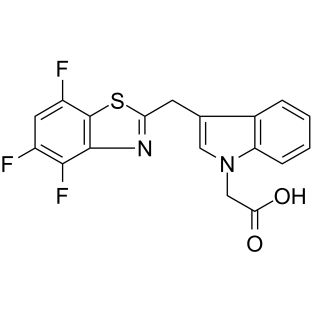| Description |
Lidorestat (IDD-676) is a potent, selective and orally active aldose reductase inhibitor with an IC50 of 5 nM. Lidorestat can be used to treat chronic diabetes complications. Lidorestat also improves nerve conduction and reduces cataract formation[1][2][3].
|
| Related Catalog |
|
| Target |
IC50: 5 nM (Rldose reductase)[1]
|
| In Vitro |
From in vitro experiments, Lidorestat has a reported IC50 against recombinant human aldose reductase (/h/-ALR2) of 5 μM. Against recombinant human aldehyde reductase (/h/-ALR1), Lidorestat has a reported IC50 of 27,000 μM, yielding a selectivity of /h/-ALR1//h/-ALR2 of 5400:1[1][2].
|
| In Vivo |
Lidorestat (25 mg/kg/day; oral administration; twice daily; for 6 weeks; diabetic mice) treatment decreases fructose and reduces mortality in diabetic hAR-expressing mice. And Lidorestat does not affect weight[1]. Animal Model: Diabetic low-density lipoprotein (LDL) receptor-deficient [Ldlr(-/-)] mice[1] Dosage: 25 mg/kg/day Administration: Oral administration; twice daily; for 6 weeks Result: Diabetic hAR-expressing mice had decreased fructose and reduced mortality.
|
| References |
[1]. Noh HL, et al. Regulation of plasma fructose and mortality in mice by the aldose reductase inhibitor lidorestat. J Pharmacol Exp Ther. 2009 Feb;328(2):496-503. [2]. Van Zandt MC, et al. Discovery of 3-[(4,5,7-trifluorobenzothiazol-2-yl)methyl]indole-N-acetic acid (lidorestat) and congeners as highly potent and selective inhibitors of aldose reductase for treatment of chronic diabetic complications. J Med Chem. 2005 May 5;48(9):3141-52. [3]. Maccari R, et al. Identification of new non-carboxylic acid containing inhibitors of aldose reductase. Bioorg Med Chem. 2010 Jun 1;18(11):4049-55.
|
